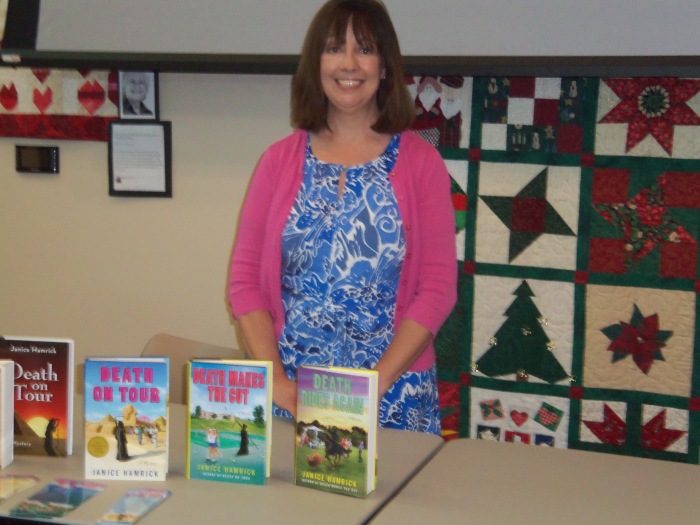What I did on my summer vacation.
Month: August 2013
Talking Turkey and Cooking Goose
In the previous episode, Kaye George, author of the Immy Duckworthy, PI mystery series, had just suggested members of Austin Mystery Writers publish an anthology of short stories. Her proposal sent me into paroxysms of insecurity and doubt: could I write two stories of acceptable quality in the time allotted? Or would I embarrass myself and slink away, ostracized from the group, never to plot again?
Now, the rest of the story:
The burning questions posed in She Cannot Get Away have been answered, in part. I can write at least one story in the time allotted me. I’ve already done so. Almost.
As with every project, the key is to start early. I started two years ago. In a retreat workshop sponsored by the Writers’ League of Texas, I wrote a fragment beginning with the following sentence:
The day I found Mama stirring ground glass into the eggs she was about to scramble, I took the eggs away from her and called a family conference.
Some readers have seen that sentence before. They may be sick of it. I’ve gotten a lot of mileage out of it, fizzing over what comes next. My critique group suggested it’s the beginning of a novel, but I don’t think the situation has the necessary elasticity. In my hands, a novel starting with four siblings plotting to “put Mama out of her misery” could end up reading like the story board of a Road Runner cartoon: Children drop a metaphorical anvil off a bridge, miss Mama by a hair, light the fuse on a stick of dynamite, miss Mama by a hair, find themselves hoist with their own petard. Over and over for three hundred pages.
Shakespeare, given the same situation, would no doubt have come up with something fresh and original. But Shakespeare didn’t see as many Warner Brothers cartoons as I have. If he had, his creative faculty might have been warped, too.
Well. On July 4 of this year, I posted here that I was optimistic about the chances of getting a story out of the ground glass. Today I report that the two-year-old fragment is now part of a short story with a beginning, a middle, and an end. At our meeting last week, Austin Mystery Writers gave it their approval. Except for one thing. And I knew before a word was said exactly what it would be.
“But nobody died,” said Kaye.
I said I knew that.
“But it’s a murder mystery,” said Gale. “Somebody has to die.”
The three critique partners sitting the other side of the table nodded. In unison.
“I was going for subtlety,” I said. “It’s a death of the spirit.”
They stared at me. I stared back.
“But somebody really has to die,” said Kaye.
And then five people said they didn’t understand the last line. I had written the entire story so I could use that line, and no one understood what it meant.
I continued to stare. A string of pejoratives ran through my brain, notably philistines, peasants, and bourgeoisie. Finally I spoke.
“Thank you,” I said.
Then my friends began throwing out ideas for endings they preferred to mine, in each of which someone died. I sighed repeatedly and said things like, Yeahhhh, and Okayyyy, and I guessss…
People who tell inconvenient truths are so irritating. Especially when they gang up on you.
We moved on to discuss someone else’s submission. We chatted a while. We gathered our books and papers and parted.
I didn’t mention they were correct: The ending as written was weak. It fell flat. When I walked into the meeting, I already knew it was wrong. And I knew they wouldn’t let me get away with it.
Thirty minutes later, I sat across town in a writing work group, staring at my laptop monitor and thinking, Kaye gave me the perfect ending. All the suggestions were good, but hers works on multiple levels. It’s so right. Why didn’t I think of it myself?
Oh, who cares about why. What matters is that Kaye thought of it, and that she and four other writers talked turkey and made me listen.
If they hadn’t–and if I hadn’t–I’d have had a bigger problem than the embarrassment of
not turning in a story for the anthology. I’d have faced the humiliation of turning in a story whose last line four highly literate women couldn’t decipher.
Critique groups meet a variety of needs: for inspiration, encouragement, advice, mentoring, ideas, retreats, gossip…and for talking turkey. Carefully. Kindly. Intelligently. Honestly. Firmly. Timely.
I owe Austin Mystery Writers–big time. Because I’m convinced that if they hadn’t talked turkey to me, my literary goose would have thoroughly cooked.
(Okay, guys, what do you have to say about that ending?)
Related Articles
- Mama and the Ground Glass Resurface (kathywaller1.com)
- MPs demand that their omelettes are made by breaking eggs (thetimes.co.uk)
- What to never add to scrambled eggs (huffingtonpost.com)
- Kaye George Comes to Austin (dgalbright.wordpress.com)
She Cannot Get Away
 If you read the previous post, reblogged from Gale Albright’s Visions and Revisions, you know mystery novelist Kaye George attended the Austin Mystery Writers meeting last week. Kaye, who for a number of years served as AMW’s Grand Pooh-Bah, moved to Tennessee last winter, leaving Gale and me forsaken and forlorn.
If you read the previous post, reblogged from Gale Albright’s Visions and Revisions, you know mystery novelist Kaye George attended the Austin Mystery Writers meeting last week. Kaye, who for a number of years served as AMW’s Grand Pooh-Bah, moved to Tennessee last winter, leaving Gale and me forsaken and forlorn.
At the Last Lunch, celebrated at the Elite Cafe in Waco, Gale and I presented Kaye a certificate declaring her Member Emerita. It was supposed to say Grand Pooh-Bah Emerita, but, distraught over her impending move, I forgot that part.
The bull pictured on the certificate is an homage to Kaye’s first published novel, CHOKE, in which heroine Imogene Duckworthy narrowly escapes death by goring. I don’t believe that’s a spoiler, since Immy later appears in both SMOKE and BROKE.
Gale and I were foolish to suffer so over our friend’s disappearance because, thanks to the miracle of email, social media, and the Eyes of Texas, which are perpetually upon her, Kaye cannot get away. She’s been gracious about our continued presence in her life. She even suggested AMW publish an anthology of mystery stories, and so we shall. Each member has agreed to write two stories related to a central theme.
The prospect of putting out an anthology is exciting for those of us who haven’t published widely (roughly four of the eight current AMW members), but for me it’s also stressful: What if I can’t deliver? What if I’m already written out? What if I have to tell Kaye George the dog ate my homework? She knows I don’t have a dog.
At this point, I should tell a story related to the questions raised in the preceding paragraph. But it’s nearly 4:00 a.m., David just exchanged sleeping on the couch for sleeping on a bed, and I’m left downstairs hearing, sort of by default, Marvin Hamlisch first say that the music of the ’80s exemplifies our country’s return to family values, and then introduce a very old person I don’t recognize to sing “Under the Boardwalk.”
In other words, I’m outta here. The story will wait until tomorrow.
***
Oh, jeez. Now they’re singing “Jeremiah Was a Bullfrog.” Those family values just won’t quit. What are the PBS folks thinking?
I have to retire now, before we all drown in sarcasm.
Kaye George Comes to Austin
Austin Mystery Writers were in a dither over a visit by Grand Pooh-Bah Emerita this week. Gale Albright supplies the gripping details.
The members of Austin Mystery Writers were clustered at their literary haunt in the BookPeople café on Thursday morning, eagerly awaiting the arrival of famed author and Grand Poobah emerita Kaye George.
“Gosh,” I said to the group. “I hope she remembers the little people.”
 I need not have worried. With all her usual charm and warmth, Kaye George appeared wearing a big fedora, carrying a giant magnifying glass, and blinding us with her dazzling smile.
I need not have worried. With all her usual charm and warmth, Kaye George appeared wearing a big fedora, carrying a giant magnifying glass, and blinding us with her dazzling smile.
We had missed Kaye George. Once a guiding beacon in AMW in Austin, she had moved to Waco, then Knoxville, Tennessee, too far away to attend the weekly critique group meetings.
However, that didn’t stop Kaye from being an active participant in AMW. She’s still a major player in the group, we’re glad to say.
 Kaye George has been an inspiration to fellow writers. She fought hard to become a published author
Kaye George has been an inspiration to fellow writers. She fought hard to become a published author
View original post 194 more words
Janice Hamrick in Pflugerville
Austin Mystery Writer Gale Albright attended novelist Janice Hamrick’s book event at the Pflugerville Public Library and writes about it on her blog.
Hopeton Hay of KAZI Book Review interviewed author Janice Hamrick at the Pflugerville Community Library on Saturday, July 20, 2013 about her new mystery novel, Death Rides Again.
HAY: I first interviewed Janice about three years ago when her first book Death on Tour came out. I met her through Scott Montgomery, crime fiction coordinator at BookPeople. Janice was one of the most delightfully entertaining guests, better than some Pulitzer Prize winners with her bubbly spirit. She won a contest with her first book, which won the national Mystery Writers Minotaur contest for first crime novel. It was great to have her on the KAZI Book Review. Janice, your lead character, Jocelyn Shore, went from Egypt in the first novel, to Austin in the second, Death Makes the Cut, and now appears in a tiny Central Texas town in Death Rides Again, the third…
View original post 1,096 more words
Go Somewhere
You have to put on your pants in the morning and go somewhere. ~ Frank Conroy

Time Of Death / Forensic Investigator Steve Rush
I’m sitting in the conference room of a coffee shop in the Greater Austin Area, working on my current short story, or, as we writers say, my WIP. Two other people sit at the table with me. We’re part of a work group called Writers Who Write. We gather here because at our respective homes, we’re too often Writers Who Don’t Write.
Anyway. I pulled up the story I’ve been working on for what seems like an eon–the story about which I’ve said on at least four occasions, “I think I can finish it today.” I read over the paragraphs I wrote three days ago, made some minor changes that could have been done any time between now and January 2014, read the same paragraphs again, shifted my fingers into neutral, and wondered–
If I engage in a game of Poppit, would my fellow writers think less of me? Would they know I’m playing Poppit? The incessant click click clicking might give me away. If they did know, would they tell on me, and to whom?
Writers are generally good people. Some, however, are fiercely competitive. Others are downright mean. And most of them are constitutionally unable to keep their mouths shut. Consider the things Ernest Hemingway wrote about F. Scott Fitzgerald. Consider what William Faulkner wrote about Ernest Hemingway. Consider what Ernest Hemingway wrote about William Faulkner. Consider what Dorothy Parker wrote about everybody.
I decided Poppit was not an option and turned to the next best thing: writing a post for my blog. Sometimes posts don’t come easily. When blogging prevents my writing what I should be writing, however, they’re a breeze. Words flow. It’s like I’m channeling myself.
But on the way to my dashboard, I stopped by my WordPress Reader and what did I find but this post by forensic investigator Steve Rush, written for the Killer Nashville blog.
I need to read this, I thought. And if I need to read this, so do all my friends and followers.* And why write my own post when the little Reblog button sits at the bottom left corner of the screen, singing its siren song.
So in a couple of minutes I’m going to click on that button and share today’s spark of Serendipity, which is one of the loveliest words I know.
* I hope all my friends are followers and all my followers are friends, but in case they aren’t, I referred to them here separately.
Accurate details prove important when including crime scenes in our prose. Three basic questions we want to answer when writing these scenes are: What was my character doing before incident? What altered and/or interrupted her/him at the inciting moment? What took place afterward?
One or two details may be all that is necessary when trying to portray realism in our story. In the old TV series Dragnet, Jack Webb’s “Just the facts” statement identified the essential elements to solve the crime in question. Insert a fascinating fact in your scenario and capture your reader’s attention. Get it wrong and you risk losing them. We want to be certain every fact in our stories fits the scenario we are trying to portray.
For murder scenes, facts we choose may include things like type of weapon used, resulting harm to the character, and any potential evidence in our setting. One of…
View original post 761 more words
Like Sending a Bucket Down the Well
I never wrote a word that I didn’t hear as I read.
~ Eudora Welty
*
Familiarity. Memory of the way things get said. Once you have heard certain expressions, sentences, you almost never forget them. It’s like sending a bucket down the well and it always comes up full. You don’t know you’ve remembered, but you have. And you listen for the right word, in the present, and you hear it. Once you’re into a story everything seems to apply—what you overhear on a city bus is exactly what your character would say on the page you’re writing. Wherever you go, you meet part of your story. I guess you’re tuned in for it, and the right things are sort of magnetized—if you can think of your ears as magnets. I could hear someone saying—and I had to cut this out—”What, you never ate goat?” And someone answering, “Goat! Please don’t say you serve goat at this reunion. I wasn’t told it was goat I was served. I thought—” and so on, and then the recipe, and then it ended up with—I can’t remember exactly now—it ended with, “You can do a whole lot of things with vinegar.” Well, all these things I would just laugh about and think about for so long and put them in. And then I’d think, that’s just plain indulgence. Take it out! And I’d take it out.
~ Eudora Welty, quoted here











